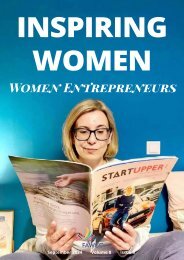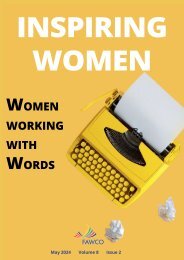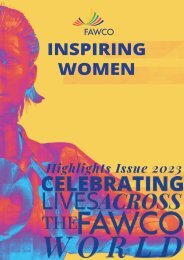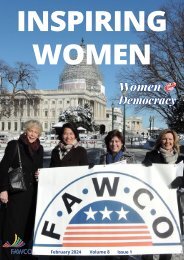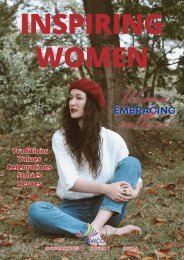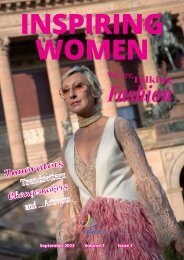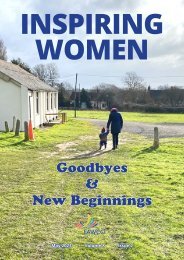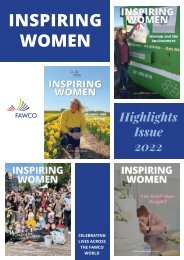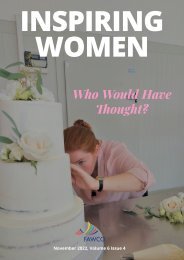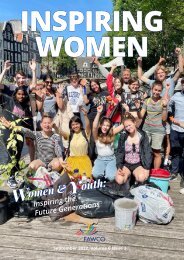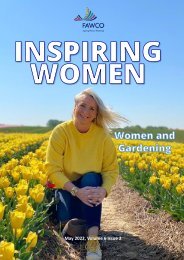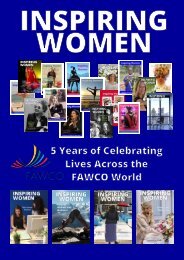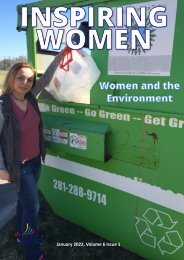Inspiring Women February 2023
You also want an ePaper? Increase the reach of your titles
YUMPU automatically turns print PDFs into web optimized ePapers that Google loves.
water as well as the nutrients, energy, and<br />
information contained in the stuff we flush<br />
away. While we see radical technological change<br />
in almost every other aspect of our lives, we<br />
remain stuck in a sanitation status quo—in part<br />
because the topic of toilets is taboo.<br />
Fortunately, there’s hope—and Pipe Dreams<br />
daringly profiles the growing army of sewagesavvy<br />
scientists, engineers, philanthropists,<br />
entrepreneurs and activists worldwide who are<br />
overcoming their aversions and focusing their<br />
formidable skills on making toilets accessible<br />
and healthier for all. Author Chelsea Wald takes<br />
us on a wild world tour from a compost toilet<br />
project to a plant that salvages used toilet paper<br />
from sewage, and shows us a toilet seat that can<br />
watch poop for signs of illness. Among other<br />
accolades, Pipe Dreams was a finalist for the<br />
2022 NASW Science in Society Journalism Award<br />
and longlisted for the 2022 AAAS/Subaru SB&F<br />
Prize for Excellence in Science Books.<br />
What was your inspiration for the book?<br />
In 2013, I got two assignments. In my work as<br />
a freelancer, two things happen: either I pitch<br />
stories or editors pitch to me. But this was<br />
very much a coincidence. These stories just<br />
came my way.<br />
The first was a story about new toilet<br />
technologies for very low resource contexts,<br />
where people might have very poor toilets or<br />
no toilets at all. The second was about heat in<br />
our cities and where we could access more of<br />
it. It turned out that there's a lot of heat in our<br />
sewers, thanks to showers, washing machines,<br />
and dishwashers. And we could pull that up<br />
again with heat pumps and use it to heat and<br />
even cool our cities.<br />
This combination of stories in a short period of<br />
time opened the lid of my mind, as I say in my<br />
book. I wanted to know more, and I saw a fairly<br />
untapped niche for myself as a writer. Looking<br />
further, I found a flurry of innovation in toilets<br />
and the infrastructure that connects to them.<br />
There are a lot of innovators in different fields,<br />
from engineering to design to sociology, thinking<br />
in new ways about the toilet. Ultimately, I turned<br />
that into a book about the future of the toilet.<br />
How long did it take you to write the book?<br />
Here’s the timeline: I got the first toilet-related<br />
writing assignment in 2013 and kept following<br />
up with more stories. Five years later, in 2018,<br />
I got the book contract, just three months<br />
after my first child was born – and on my 40th<br />
birthday. I turned in my complete draft in April<br />
2020, just after the pandemic started. So I could<br />
answer this question in a lot of different ways<br />
– but, any way you look at it, these years have<br />
been very eventful!<br />
What kind of research do you do, and how<br />
long do you spend researching before<br />
beginning a book?<br />
As a journalist, I use several types of sources<br />
to gather information. I speak to experts, as<br />
well as read loads of papers and books on the<br />
science and history of the topic. I also prefer to<br />
go look around at projects in person. My trip<br />
to Haiti illustrates why this is important. I was<br />
going to look at a social enterprise called SOIL<br />
that provides a toilet service to people in very<br />
poor urban areas. The business picks up full<br />
containers and drops off empty ones – kind of<br />
like a curbside recycling program. It sounds<br />
pretty simple until you see what happens<br />
when it rains: many flooded roads become<br />
unnavigable, and workers have to wade in<br />
thigh-deep water as they make their rounds.<br />
Experiencing this with my own senses helped<br />
me appreciate and describe the magnitude<br />
of what this organization is<br />
attempting to achieve.<br />
What is the most important thing<br />
you want readers to take away<br />
from your book?<br />
We can ask so much more of our<br />
toilets in terms of health,<br />
environment, and equity. The toilet<br />
can be a powerful tool for making<br />
the world a better place because<br />
everybody poops.<br />
When did you start writing?<br />
I started journalism school in 2002<br />
but I’ve been writing as long as I<br />
can remember. I wrote poems in<br />
elementary school and plays in high<br />
school. Science journalism was my<br />
attempt at marrying my interests in<br />
writing and science.<br />
As a writer, what would you choose as your<br />
mascot/avatar/spirit animal?<br />
For the sake of this book, I would choose a<br />
wombat. They poop cubes.<br />
What’s your favorite under-appreciated<br />
novel?<br />
While Victor Hugo’s Les Misérables probably isn’t<br />
under-appreciated (hello, Broadway!), what most<br />
people probably don’t know is that it contains<br />
lengthy passages about the history and meaning<br />
of the sewer system. I found them particularly<br />
fascinating while writing Pipe Dreams. My<br />
favorite line: “The sewer is the conscience of<br />
the city.”<br />
What is your favorite childhood book?<br />
Keeping to the theme, I would recommend<br />
Frank Herbert’s Dune to older children. I read<br />
it in my early 20s but it’s a thrilling read for<br />
teenagers. The characters on the desert planet<br />
wear “stillsuits” that recapture all the body’s<br />
moisture, creating a kind of closed loop.<br />
Ideally, that’s what our sanitation systems<br />
could do someday.<br />
What are you reading now?<br />
This and that. On my bedside table is a pile<br />
of parenting books that I find somehow<br />
comforting, though I can’t read them all. I’m<br />
partway through the final book in Hilary Mantel’s<br />
Wolf Hall trilogy – but I think I’m procrastinating<br />
because I’ll be sad to finish it. What a giant<br />
she was!<br />
If you could tell your younger writing-self<br />
anything, what would it be?<br />
You are funny.<br />
What’s next for you? Are you working on<br />
anything new you’d like to share with our<br />
readers?<br />
I had a second child in July so I am taking some<br />
time away from work to spend with her and to let<br />
some new project ideas percolate.<br />
Writing a book can be a lonely<br />
business, so I’m hoping to<br />
find something more<br />
collaborative.<br />
Books presented in the<br />
<strong>Inspiring</strong> Reads feature are<br />
available for purchase via<br />
the FAWCO website in the<br />
Books by Members or Books<br />
by Clubs sections.<br />
Enjoy!<br />
66 INSPIRING WOMEN INSPIRING WOMEN 67




